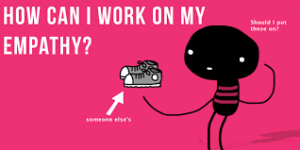Empathy is a word that many people define incorrectly. Simply, it means “the ability to understand and share the feelings of another.” It is rarely listed first on a list of soft skills – but maybe it should be.
“The ability to temporarily take up residence in someone else’s perspective frees you from your own narrow thoughts and snap judgments. It neutralizes your hard feelings and imbues you with a softer approach to disputes and difficult employees”. (Forbes – Workplace Empathy Packs A Powerful Punch: Discover The Jaw-dropping Results, by Bryan Robinson, Ph.D.)
Some believe that the ability to be empathetic is a natural one. You’re either born with it, or you’re not. This is not the case. You can develop this ability by thinking things through differently. For instance, someone you work with has suddenly (in your estimation) become hard to get along with. They snap when they become frustrated and become emotional over what seem to you to be minor issues. Before you started working on your empathy, what would you have done? Maybe snap back; go to your boss about the behavior; begin to leave that person off your team? No, you are increasing your empathy – so instead, you look back to when this behavior started and try to discover the cause.
What do you find? This co-worker has elderly parents who have just moved in with her, both are infirm, and she has suddenly become a caregiver. Rather than go home after a stressful day and relax, she goes home to feed and bathe both parents and then tend to the many normal home duties she has. Her stress level has multiplied enormously.
What do you do?
Number 1 – how would you cope if it were you? What would you need from your co-workers? This requires some thought because before your empathy raising efforts – you would have said you” don’t want anything from your co-workers, and they do not need to know about my stress.” Don’t confuse empathy with pity, either. It’s making an effort to understand how this co-worker feels and reacting in a manner that supports rather than ignores or denigrates the feeling.
To let your empathy kick in, start by taking a deep breath. Answering a snappy remark with one of your own is counter-productive, shuffling your feet, and looking at the floor when she suddenly tears up is also counter-productive. Calm replies, maybe tell the group to take a five-minute break, or just a light pat on the shoulder can show your empathy without damaging your position as a leader or co-worker.
Where else can you show your empathy? If you know this person needs to be home by 6:00 pm every day, try not to schedule her for later, and if you have to – give her plenty of advance notice. As a co-worker, don’t be offended when she grabs her stuff and rushes out the door at the exact quitting time, you know why.
Sometimes you don’t know why – the co-worker doesn’t talk about her private life, and that’s OK. Practice your empathy by noticing behavior, and rather than read something less than flattering into it, deal with it fairly.
As a manager, you may have to ask an employee about a certain behavior. That’s part of your job! Remember to be fair, not judgmental. Just because you think you could handle her issues better doesn’t mean she does not deserve your support. That’s empathy again, rather than treating with contempt, you treat with understanding.
It’s not always easy to tell if the behavior you observe in others is empathy in action, so it could be difficult find someone to model your behavior on. If you are comfortable in their company, it’s a good bet that they are empathetic.


Comments are closed.